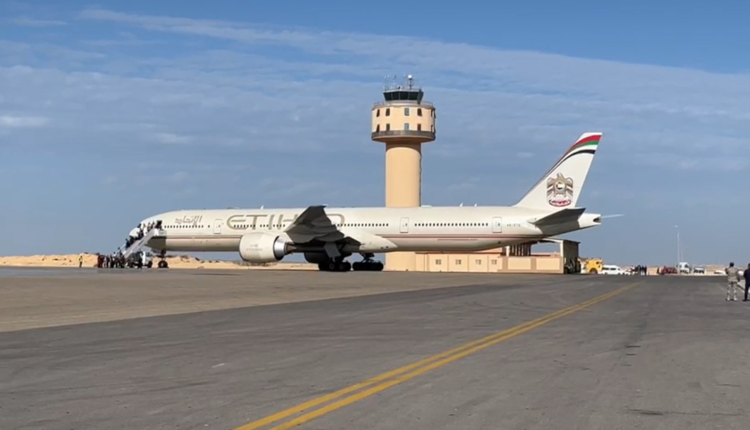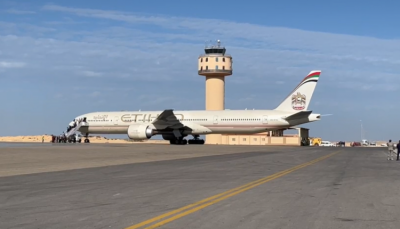In a historic visit, a delegation from the UN Security Council arrived at Al-Arish Airport, comprising representatives from both current and new member states. Their aim was to observe the humanitarian relief efforts for Gaza in Rafah and the minimal humanitarian aid entering the region. This visit was arranged at the invitation of the United Arab Emirates, a non-permanent member of the Security Council, which last week introduced a draft resolution calling for an immediate ceasefire in Gaza for humanitarian reasons. This initiative comes amid efforts to alleviate the humanitarian suffering in Gaza, exacerbated by the collapse of a ceasefire the previous week.
The United States exercised its veto against the resolution, causing widespread international outrage. Notably, the representatives of the U.S. and France were absent from the tour. The delegation departed from Abu Dhabi on an Etihad Airways flight, accompanied by several journalists.
According to the initial schedule, the visit includes checking the humanitarian operations at Al-Arish Airport and meetings with the Governor of North Sinai, an official from the Egyptian Ministry of Foreign Affairs, the head of operations at the Egyptian Red Crescent, Lotfi Ghait, the representative of the Palestinian Red Crescent in Egypt, and briefings from officials in UN agencies. The tour will also include a visit to Al-Arish Hospital and a field visit to the Rafah crossing.
The delegation members include: Lana Nusseibeh (UAE), Maha Barakat (UAE), Farid Hoxha (Albania), Sergio Franca Danese (Brazil), Zhang Jun (China), José Javier de la Gasca López Domínguez (Ecuador), Harold Adlai Agyeman (Ghana), Vanessa Fraser (Malta), Pedro Comissário Afonso (Mozambique), Vasily Nebenzya (Russia), Barbara Woodward (United Kingdom), Samuel Zbogar (Slovenia), Trishala Persaud (Guyana), Mitsuko Shino (Japan), and Seung Jin Kim (South Korea), Amara Sow (Sierra Leone), Adrian Dominique Hauri (Switzerland), and Philippe Lazzarini (UNRWA), and Lynn Hastings (UNLP).
It was decided that 12 Security Council ambassadors would visit the border between Egypt and the Gaza Strip today, just days after UN Secretary-General Antonio Guterres warned that thousands of people in the besieged Palestinian territory are "starving."
The UAE organized the visit to Rafah, where limited humanitarian aid and fuel supplies have crossed into Gaza, while the 15-member Security Council negotiates a draft resolution put forth by the UAE calling for both warring parties to "allow the use of all land, sea, and air routes leading to Gaza and throughout its territories" to facilitate the delivery of aid. The draft also includes the establishment of a UN-managed aid monitoring mechanism in Gaza. However, it is not immediately clear when the draft resolution will be put to a vote.
Lana Nusseibeh, the UAE's representative to the UN, stated that the purpose of the visit is "to gain firsthand knowledge of what is required to expand humanitarian operations that meet the needs of the Palestinian people in Gaza." She noted that it is not an official Security Council visit.
The U.S. will not send a representative on this visit, following its veto of a proposal for an immediate ceasefire for humanitarian reasons in the conflict between Israel and the Palestinian Islamic resistance movement (Hamas) in Gaza last week. U.S. Mission spokesperson Nate Evans stressed that "the United States fully recognizes the extremely difficult situation in Rafah and is working around the clock to try to improve the on-the-ground situation." He added that U.S. diplomacy "continues to yield results" and highlighted Washington's clarity regarding the need for increased aid and continued support for a humanitarian truce that could facilitate the release of hostages and increased assistance.
France and Gabon also did not send their representatives on the trip to Rafah, with the French Mission to the UN not responding to requests for comment. Guterres stated in a social media post yesterday, "I urged the Security Council to act to avoid a humanitarian catastrophe in Gaza and reiterated my call for a ceasefire for humanitarian reasons. Unfortunately, the Security Council has failed to do so." He, who took the rare step of officially warning the Security Council on Wednesday about the global threat posed by the conflict, reiterated, "But that doesn’t make it any less necessary. I promise you: I will not stop that."
### General Assembly Vote
The United Nations General Assembly will hold a meeting tomorrow regarding the situation in Gaza at the request of Arab countries and members of the Organization of Islamic Cooperation. Diplomats indicated that the assembly of 193 members is expected to vote on a draft resolution demanding an immediate ceasefire for humanitarian reasons.
In October, the General Assembly adopted a resolution by a majority of 121 votes in favor and 14 against, with 44 abstentions, calling for the establishment of a "immediate, lasting, and sustainable humanitarian truce leading to a cessation of hostilities."
Israel has conducted airstrikes on Gaza, imposed a blockade, and launched a ground assault in response to an attack carried out by Hamas in southern Israel on October 7. Israel claims that the Hamas attack resulted in 1,200 deaths and the kidnapping of 240 hostages. Meanwhile, health authorities in Gaza report that around 18,000 people have been killed due to Israeli attacks, with 49,500 injured. The vast majority of the 2.3 million residents in the Palestinian territory have been displaced from their homes.
Guterres told the Security Council on Friday, "Half of the northern population and more than a third of those displaced in the south are starving." The UN Office for the Coordination of Humanitarian Affairs (OCHA) reported that 100 trucks carrying humanitarian supplies entered Gaza from Egypt yesterday, matching the number from the previous day. OCHA noted that this figure is "far below" the daily average of 500 truckloads, including fuel, that used to enter before October 7. Guterres stated on Friday, "The conditions necessary for effectively delivering humanitarian aid no longer exist." He added, "The Rafah crossing has not been equipped to handle hundreds of trucks and is the main bottleneck."
The UN is pressing for the opening of the Kerem Shalom crossing controlled by Israel. Israel agreed to allow its use for inspection operations, but not for entering Gaza. Trucks are inspected at Kerem Shalom before crossing into Gaza from Rafah, which is about three kilometers away.
The UAE has also invited the new Security Council members, which include Algeria, Guyana, Sierra Leone, Slovenia, and South Korea, who will begin their two-year term on January 1. These countries are replacing Albania, Brazil, Gabon, Ghana, and the UAE. Algeria is the only country that did not send a representative.




